Coronavirus seems to be all anyone's talking about right now, but you won't be alone in wondering what you actually need to do to self-isolate. Worry not as this guide explains all.
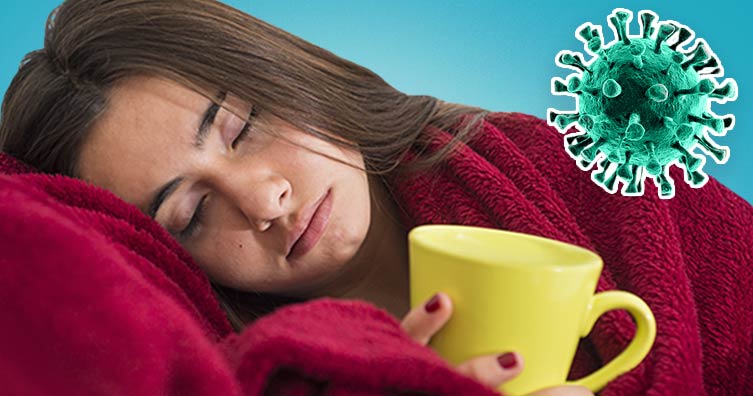 With so much info about COVID-19 (a type of coronavirus) to take in at the moment, it can be hard to know what steps to be following to try to prevent catching and passing on the illness.
With so much info about COVID-19 (a type of coronavirus) to take in at the moment, it can be hard to know what steps to be following to try to prevent catching and passing on the illness.
Ultimately, try not to let all the news around the virus panic you. Here, we'll explain how you can reduce your chances of getting COVID-19, when you need to self-isolate and how to approach self-isolation when living in shared accommodation.
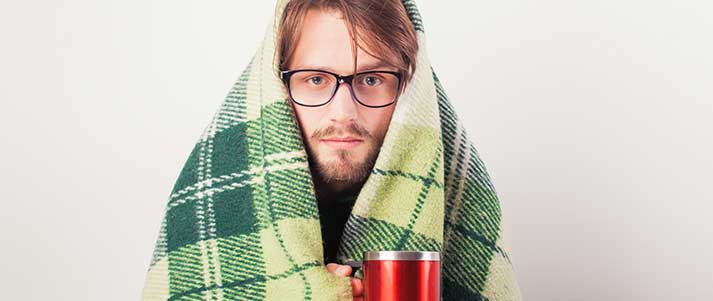 Coronaviruses are a family of viruses that can cause illness in animals or humans – COVID-19 is the most recently-discovered coronavirus to reach humans, but the previous ones have, on the whole, appeared more like colds.
Coronaviruses are a family of viruses that can cause illness in animals or humans – COVID-19 is the most recently-discovered coronavirus to reach humans, but the previous ones have, on the whole, appeared more like colds.
COVID-19, which means Coronavirus Disease 2019, was declared as a pandemic by the World Health Organisation (WHO) on Wednesday 11th March 2020. This was because the spread of the disease around the world exceeded expectations for a new virus, for which people don't have immunity.
As the illness is new, experts are still uncertain about some aspects of COVID-19. That said, it's currently believed that it usually takes up to 14 days for symptoms to start after you catch the virus (this is known as the 'incubation period').
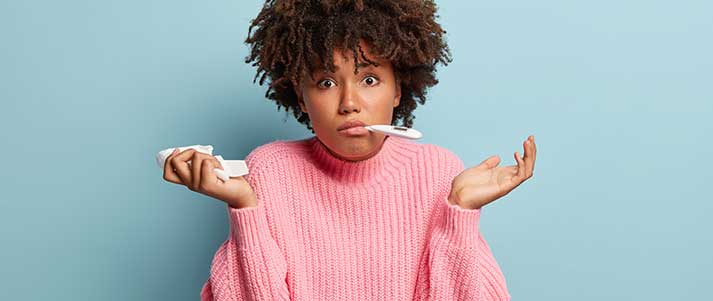 According to the WHO, these are the most common symptoms of the COVID-19 illness:
According to the WHO, these are the most common symptoms of the COVID-19 illness:
However, COVID-19 symptoms usually begin gradually and stay mild. And, it's important to note that some people with the virus are asymptomatic and don't experience any symptoms at all.
It's currently unclear whether people who are asymptomatic while infected with COVID-19 are likely to spread the infection on to others. Whether you have symptoms or not, though, it's vital for us all to be careful, follow social distancing measures and regularly wash our hands.
 On 28th May, the NHS test and trace service launched in England. It's hoped that the system (known as contact tracing) will allow the government to further ease the lockdown restrictions, while continuing to control the spread of COVID-19.
On 28th May, the NHS test and trace service launched in England. It's hoped that the system (known as contact tracing) will allow the government to further ease the lockdown restrictions, while continuing to control the spread of COVID-19.
There are similar systems in place in Northern Ireland, Scotland and Wales.
The test and trace systems in the UK follow a similar structure – they aim to quickly test potential cases of COVID-19, identify who has recently been in close contact with people who test positive for coronavirus, and encourage any potential cases to self-isolate.
'Close contact' refers to:
You can also stop self-isolating if you test negative and no longer have symptoms similar to COVID-19 (if you're unwell with the flu or a different virus, it's still advisable to stay away from others until you're feeling better).
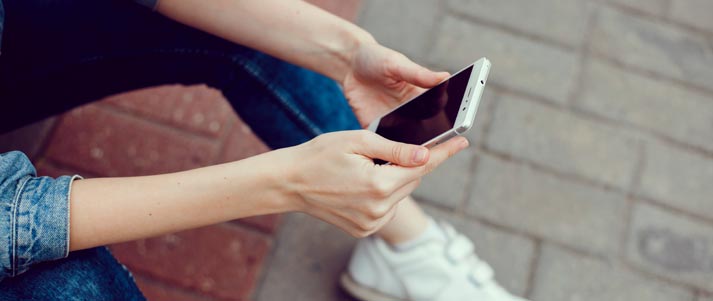 If somebody that you've been in recent contact with tests positive for COVID-19, here are the test and trace steps to follow:
If somebody that you've been in recent contact with tests positive for COVID-19, here are the test and trace steps to follow:
If someone in your household or social bubble develops symptoms, you will also need to self-isolate for 14 days from the start of their symptoms (more on this below).
As an overview, here are the key reasons you might need to self-isolate:
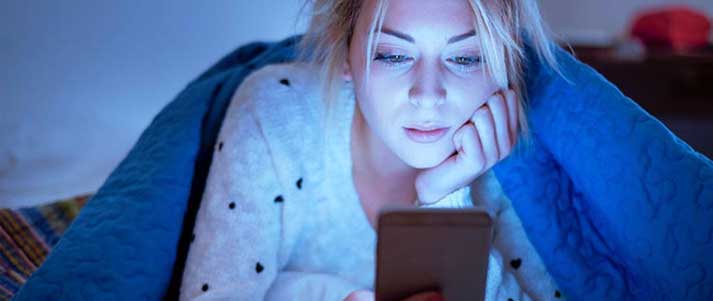 The reason why it's important to self-isolate if you have COVID-19 is that there's a risk you could pass it on to others as it spreads quickly.
The reason why it's important to self-isolate if you have COVID-19 is that there's a risk you could pass it on to others as it spreads quickly.
While you may have no problem fighting off the illness, for others it can be serious – particularly for the elderly and those with pre-existing medical conditions.
So, if you experience the symptoms of COVID-19, you can help to prevent the spread of the disease as much as possible by self-isolating.
However, if you're self-isolating because someone in your house or support bubble has had symptoms of COVID-19, you will need to stay at home for 14 days from when your housemate's symptoms started. This is because it can take 14 days for you to start having symptoms after catching the virus.
If more than one person in your house or support bubble has symptoms, your 14 days of self-isolation follow when the first person started having symptoms.
And, if you're self-isolating for 14 days because your housemate or somebody in your support bubble has symptoms, and you develop symptoms during this time, you will then need to self-isolate for a further seven days from the start of your symptoms (even if that means you're self-isolating for over 14 days altogether).
The NHS advise that you don't need to continue self-isolating if you just have a cough or changes to your sense of taste or smell after seven days as these symptoms can last for several weeks after the infection's gone.
However, if your symptoms get worse or you're still unwell seven days after the symptoms started, visit NHS 111 online or call NHS 111.
 When self-isolating in shared accommodation, it's advisable to DO the following things:
When self-isolating in shared accommodation, it's advisable to DO the following things:
 Of course, a lot of the above things are easier said than done when living in a student house with several others. But, it's super important to follow the NHS guidelines as much as you can if you fit the description of those being asked to self-isolate.
Of course, a lot of the above things are easier said than done when living in a student house with several others. But, it's super important to follow the NHS guidelines as much as you can if you fit the description of those being asked to self-isolate.
On top of the above suggestions from the NHS website, the government also suggests that you avoid using shared spaces as much as possible, including kitchens, bathrooms and living rooms. Try to keep these areas well ventilated.
If you need to cook, you should only use the kitchen when no one else is there. It's a good idea to then use disinfecting cleaning products to clean the surfaces you've touched.
You should eat your meals in your room. And, the best way to clean your dishes is with a dishwasher but, if you don't have one, you can use washing up liquid and warm water, before drying them with a separate tea towel to the rest of the house.
For shared toilets and bathrooms, try to clean them after each use. Again, it's also worth using a separate towel to your other housemates to dry your hands.
 There's been a huge amount of confusion over how (or even if) it'll be possible for students to study on-campus in the 2020/21 academic year if social distancing measures are still in place.
There's been a huge amount of confusion over how (or even if) it'll be possible for students to study on-campus in the 2020/21 academic year if social distancing measures are still in place.
To find out more about universities' plans for September, we spoke to Universities UK, an organisation that acts as the collective voice of 137 unis across England, Northern Ireland, Scotland and Wales. We go into detail about what we learned in our news article.
Or, if you're short on time, here's a quick look at some of the approaches universities might implement in the next academic year:
However, it has been confirmed that, even if courses are taught online due to the pandemic, students would still be required to pay full tuition fees as long as there is still good-quality teaching.
 These are the best things to do while self-isolating at home to make money, keep active and stay as positive as you can:
These are the best things to do while self-isolating at home to make money, keep active and stay as positive as you can:
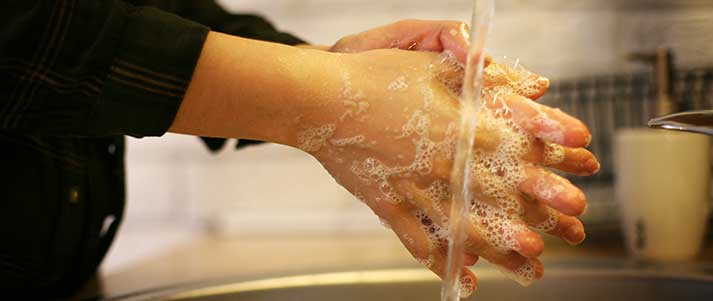 COVID-19 is often spread by people coughing, but it's not just those nearby who can catch the disease this way.
COVID-19 is often spread by people coughing, but it's not just those nearby who can catch the disease this way.
If someone with the virus coughs or exhales, small droplets from their nose or mouth can land on surfaces or objects. People could then touch the infected areas and catch COVID-19 themselves when they then touch their eyes, nose or mouth.
Because of this, you need to cover your mouth and nose with tissues each time you cough and sneeze. Then, throw away the tissue and wash your hands.
One of the best ways to prevent the spread of coronavirus infection is by regularly washing your hands for at least 20 seconds with warm soap and water.
Alcohol-based hand sanitisers are also good if you aren't able to quickly wash your hands.
And, remember to wear a face-covering when travelling on public transport.

Credit: sezer66, creativeneko – Shutterstock
Ultimately, try not to let all the news around the virus panic you. Here, we'll explain how you can reduce your chances of getting COVID-19, when you need to self-isolate and how to approach self-isolation when living in shared accommodation.
The information in this guide is accurate as of 22nd June. Keep an eye on this page for the latest advice as we will keep it updated.
What is coronavirus?

Credit: Paranamir – Shutterstock
COVID-19, which means Coronavirus Disease 2019, was declared as a pandemic by the World Health Organisation (WHO) on Wednesday 11th March 2020. This was because the spread of the disease around the world exceeded expectations for a new virus, for which people don't have immunity.
As the illness is new, experts are still uncertain about some aspects of COVID-19. That said, it's currently believed that it usually takes up to 14 days for symptoms to start after you catch the virus (this is known as the 'incubation period').
If you're finding the news about coronavirus a bit overwhelming, be sure to take care and look after your mental health. 

Common symptoms of coronavirus

Credit: WAYHOME studio – Shutterstock
- Fever
- Tiredness
- Dry cough.
- Aches and pains
- Sore throat
- Diarrhoea
- Conjunctivitis
- Headache
- Loss of taste or smell
- Rash on skin
- Discolouration of fingers or toes.
- Shortness of breath or difficulty breathing
- Sensation of pain and/or pressure in your chest
- Loss of movement or speech.
However, COVID-19 symptoms usually begin gradually and stay mild. And, it's important to note that some people with the virus are asymptomatic and don't experience any symptoms at all.
It's currently unclear whether people who are asymptomatic while infected with COVID-19 are likely to spread the infection on to others. Whether you have symptoms or not, though, it's vital for us all to be careful, follow social distancing measures and regularly wash our hands.
If you haven't already, check out our guide to getting cheap healthcare.
Test and trace systems in the UK

Credit: Sven Hansche - Shutterstock
There are similar systems in place in Northern Ireland, Scotland and Wales.
The test and trace systems in the UK follow a similar structure – they aim to quickly test potential cases of COVID-19, identify who has recently been in close contact with people who test positive for coronavirus, and encourage any potential cases to self-isolate.
'Close contact' refers to:
- Being less than one metre away from someone
- Being less than two metres away from someone for over 15 minutes
- Travelling in a small vehicle with someone (e.g. a car), or near somebody on a plane.
What to do if you have coronavirus symptoms
If you develop symptoms of coronavirus, here are the steps you should take to follow the test and trace system:- When you start experiencing symptoms of COVID-19 (i.e. a new and continuous cough, a high temperature and/or a loss or change to your sense of smell or taste), order a test to find out if you have the virus.
- As well as ordering the test, follow the self-isolation guidelines, along with your household.
- If you test positive for coronavirus, you'll be alerted by the NHS test and trace service by a text, email or phone call, and you'll need to let them know who you've been in recent close contact with.
- The test and trace service will then contact people that you've been in close contact with who might need to self-isolate.
You can also stop self-isolating if you test negative and no longer have symptoms similar to COVID-19 (if you're unwell with the flu or a different virus, it's still advisable to stay away from others until you're feeling better).
What to do if you've been in contact with someone who has coronavirus

Credit: sergey causelove – Shutterstock
- You will be alerted by the NHS test and trace service by a text, email or phone call to let you know that someone you've been in close contact with has tested positive for coronavirus.
- You should then log on to the NHS test and trace website.
- You'll need to start self-isolating for 14 days. Your household will only need to self-isolate with you if you have COVID-19 symptoms, but they should still be careful to follow social distancing measures, regularly wash their hands and avoid contact with you.
- If you then develop symptoms, you will need to order a test and follow the self-isolation measures along with your household. And, if you test positive, you'll be contacted by the NHS test and trace service and will need to identify people you've recently been in close contact with.
When should you self-isolate?
If you have a new and continuous cough, a high temperature and/or a loss or change to your sense of smell or taste, you should self-isolate for seven days from the start of your symptoms. This means staying at home and not going out for a full week after the start of your symptoms.If someone in your household or social bubble develops symptoms, you will also need to self-isolate for 14 days from the start of their symptoms (more on this below).
As an overview, here are the key reasons you might need to self-isolate:
- You have symptoms of COVID-19
- You're waiting for a coronavirus test result
- You've tested positive for the virus
- You live with someone who has symptoms, is waiting for a test result or has tested positive
- You're in a support bubble with someone who has symptoms, is waiting for a test result or has tested positive.
Why is it important to self-isolate?

Credit: tommaso79 – Shutterstock
While you may have no problem fighting off the illness, for others it can be serious – particularly for the elderly and those with pre-existing medical conditions.
So, if you experience the symptoms of COVID-19, you can help to prevent the spread of the disease as much as possible by self-isolating.
How long should you self-isolate for?
If, after seven days from the start of your symptoms, you have a normal temperature and you feel better, you should be fine to stop self-isolating, but you will still need to keep following the government's social distancing measures.However, if you're self-isolating because someone in your house or support bubble has had symptoms of COVID-19, you will need to stay at home for 14 days from when your housemate's symptoms started. This is because it can take 14 days for you to start having symptoms after catching the virus.
If more than one person in your house or support bubble has symptoms, your 14 days of self-isolation follow when the first person started having symptoms.
And, if you're self-isolating for 14 days because your housemate or somebody in your support bubble has symptoms, and you develop symptoms during this time, you will then need to self-isolate for a further seven days from the start of your symptoms (even if that means you're self-isolating for over 14 days altogether).
The NHS advise that you don't need to continue self-isolating if you just have a cough or changes to your sense of taste or smell after seven days as these symptoms can last for several weeks after the infection's gone.
However, if your symptoms get worse or you're still unwell seven days after the symptoms started, visit NHS 111 online or call NHS 111.
Our guide to making money quickly has plenty of ideas to help you earn some cash online while self-isolating.
How to self-isolate in a shared house

Credit: Manchesterphotos - Wikimedia
- Keep at least two metres away from other people in the house, particularly if you live with anyone who's older or who has a long-term health condition
- Ask others to bring you things like food and medicines, but avoid direct contact with them (anything you're brought should be left outside your door)
- Sleep alone
- Get plenty of sleep and rest
- Regularly wash your hands for at least 20 seconds, using soap and warm water
- Drink lots of water and take paracetamol to help with your symptoms.
- Having visitors
- Leaving the house, including for exercise.
Self-isolating in student accommodation

Credit: Objective Productions
On top of the above suggestions from the NHS website, the government also suggests that you avoid using shared spaces as much as possible, including kitchens, bathrooms and living rooms. Try to keep these areas well ventilated.
If you need to cook, you should only use the kitchen when no one else is there. It's a good idea to then use disinfecting cleaning products to clean the surfaces you've touched.
You should eat your meals in your room. And, the best way to clean your dishes is with a dishwasher but, if you don't have one, you can use washing up liquid and warm water, before drying them with a separate tea towel to the rest of the house.
For shared toilets and bathrooms, try to clean them after each use. Again, it's also worth using a separate towel to your other housemates to dry your hands.
For more advice, including how to handle laundry and dispose of waste while self-isolating, see the government's guidance for people with possible or confirmed coronavirus infection.
Social distancing at university 2020/21

Credit: Pajor Pawel - Shutterstock
To find out more about universities' plans for September, we spoke to Universities UK, an organisation that acts as the collective voice of 137 unis across England, Northern Ireland, Scotland and Wales. We go into detail about what we learned in our news article.
Or, if you're short on time, here's a quick look at some of the approaches universities might implement in the next academic year:
- Blended learning – There could be a 'blend' between online and in-person teaching at universities. Lectures will likely still be online as it would be difficult to maintain social distancing measures if they were held in-person in busy lecture halls. However, some small classes could be taught on-campus.
- A 'bubble' approach – This could involve students from the same subject getting allocated places together in halls to minimise social contact beyond a relatively small group.
- Changes to freshers' week – Freshers' week events could be delivered online and/or in small group sizes.
However, it has been confirmed that, even if courses are taught online due to the pandemic, students would still be required to pay full tuition fees as long as there is still good-quality teaching.
17 things to do during self-isolation

Credit: Nicolas Maderna – Shutterstock
- Do free workouts at home
- Try a quick way to make money online
- Take a free online course to gain a qualification
- Host a digital dinner party via Skype
- Get paid to watch videos
- Learn a new language
- Chat with someone new on a dating app
- Find your next favourite book
- Start a new hobby (you can currently take free online piano lessons until September)
- Complete paid online surveys
- Become a product tester
- Start writing a blog (you could even blog about your experience of self-isolating!)
- Try a new recipe
- Pamper yourself with homemade beauty treatments
- Catch up on your favourite boxsets
- Shop for bargains online
- Most importantly, take care and look after your mental health.
Extra ways to help prevent the spread of coronavirus

Credit: Liderina – Shutterstock
If someone with the virus coughs or exhales, small droplets from their nose or mouth can land on surfaces or objects. People could then touch the infected areas and catch COVID-19 themselves when they then touch their eyes, nose or mouth.
Because of this, you need to cover your mouth and nose with tissues each time you cough and sneeze. Then, throw away the tissue and wash your hands.
One of the best ways to prevent the spread of coronavirus infection is by regularly washing your hands for at least 20 seconds with warm soap and water.
Alcohol-based hand sanitisers are also good if you aren't able to quickly wash your hands.
And, remember to wear a face-covering when travelling on public transport.
from Fruitty Blog https://ift.tt/2Vet4az
via IFTTT
No comments:
Post a Comment